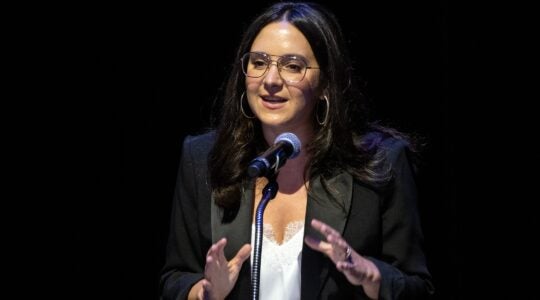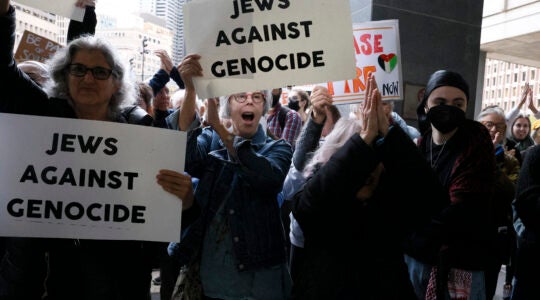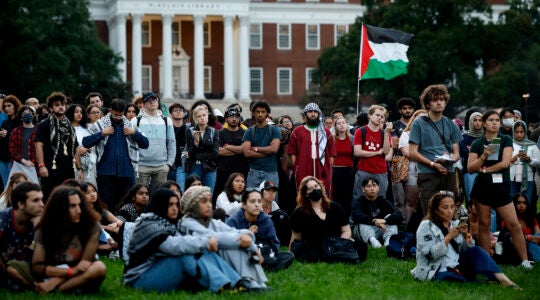NEW YORK (JTA) — The board of directors of Brandeis University has tapped the dean of George Washington University’s law school as its next president.
Frederick Lawrence, who has been the dean at George Washington Law since 2005, will succeed Jehuda Reinharz, who announced last fall that he would be leaving Brandeis after 16 years guiding the suburban Boston university.
Lawrence, an expert in hate crimes law who received his law degree from Yale, served on the Boston University faculty for 17 years before moving on to GW, and was BU’s associate dean of students from 1996 to 1999. He turns 55 on July 12.
In tapping Lawrence as president, a position he will assume in January, the Brandeis board has selected a figure bent on preserving the school’s Jewish identity.
“There are two main pieces of the Brandeis story and mission that speak to me, my career and my life,” Lawrence told JTA this week. “One, the remarkable opportunity to build a research college, which is a very unusual position for a small liberal arts college. The other piece of it was the opportunity to have a strong nonsectarian school that has deep roots in the Jewish community.”
Brandeis’ ethnic character has been a matter of ferment since the school was founded in 1948 by a small group of Jewish intellectual elites in response to Jewish quotas at Ivy League colleges.
The university rankled many prominent Jewish thinkers early on by holding its first commencement on Saturday, the Jewish Sabbath. The debate over its Jewish character reached a boiling point during the late 1980s when Brandeis — then led by Evelyn Handler — engaged in an open campaign to downplay its Jewish identity in a bid to draw more non-Jewish students.
Reinharz, who will become the head of the Mandel Foundation, is credited with rebuilding the Jewish identity of Brandeis, turning the school into the country’s pre-eminent nondenominational center for Jewish study and research.
Under his tenure, Brandeis established the Crown Center for Middle East Studies, the Mandel Center for Jewish Education, the Cohen Center for Modern Jewish Studies and the Steinhardt Social Research Institute. Reinharz is credited as well with rebuilding the university’s department of Near Eastern and Judaic Studies.
Lawrence said the school’s Jewish roots are of particular interest to him.
“Brandeis, as articulated in its four pillars, is a nonsectarian school with deep roots in the Jewish community,” he said. “That means from the sponsorship of the friends of the school to its many programs and curricula. It speaks to the social justice mission of the school.”
The school’s Jewish character, he said, “is an undeniable and extremely valuable part of the tradition. It is something I am not just comfortable with, but it was desirable to me.”
“The scholarship of the school will have a particular interest in it, especially in the social sciences and international relations, and there will be particular roles for Mideastern studies and Jewish studies, not just in the humanities but in the social sciences as well — and in the kinds of students we are trying to attract. It will be a place Jewish students will have a particular kind of home.”
Lawrence’s own Jewish roots are diverse. He grew up in the Flatbush section of Brooklyn, N.Y., where as a child he attended a Reform synagogue his parents helped found — and that employed a rabbi that had both Reform and Orthodox rabbinic ordination.
During his years in Boston, Lawrence and his wife, Kathy, were members of the egalitarian synagogue Kehilath Israel in Brookline — Lawrence said they plan to rejoin the congregation upon their return to Boston. In Washington, the Lawrences are members of Kesher Israel, the Orthodox synagogue that counts U.S. Sen. Joe Lieberman among its members.
Lawrence, who is also a singer and has performed at Carnegie Hall, helped make his name through lay involvement with the Anti-Defamation League.
After serving as an assistant U.S. attorney under Rudy Giuliani, who went to become the mayor of New York City, and working in the office’s civil rights unit, Lawrence went to BU and also became a member of the Massachusetts attorney general’s Hate Crimes Task Force through his work with ADL. He served as chairman of the ADL’s national legal affairs committee, where he co-authored a number of friend-of-the-court briefs submitted to the U.S. Supreme Court.
His book, “Punishing Hate: Bias Crimes Under American Law,” was published by Harvard University Press in 1999. In 2009 he edited one of five volumes of the treatise “Responding to Hate Crime.”
Brandeis, he said, will offer him a unique challenge academically and personally.
Lawrence steps into the position at a challenging time. Over the past two years, Brandeis has been reeling financially from the recession and the significant hit taken by some major donors in the Bernard Madoff scandal. The fiscal woes spurred the decision, and controversy, to sell off a portion of the university’s Rose Art Museum collection.
The school’s fund raising dropped to $78 million in 2009 from $90 million in 2008, according to the student newspaper, The Justice. Last September, Reinharz surprised many when he announced abruptly — just one year into a five-year contract extension — that he was stepping down.
While Lawrence was at GW, the law school tripled its available scholarship money, vastly increased its international partnerships, especially in India, and saw its best fund-raising year ever during 2009. But even at its height, GW Law under Lawrence took in $12.5 million — a far cry from what he will have to raise in his new post at Brandeis, which has a student population of 6,000.
“I am not unaware of the challenge Brandeis and other institutions face in this economic climate, but we have a mission, and it is an important mission,” he said.
“The way in which the university has dealt with its financial challenges over the past years is something I am impressed with and proud of,” Lawrence said. Some schools “just take the easy route with across-the-board cuts, but that is not commitment to excellence. If you are really going to be committed to excellence, you have to look at things you have to do at the highest level, what you need to maintain, and what you can’t maintain and have to let go.”
He added, “I have had several opportunities that I did not follow up on, but Brandeis was too interesting and important not to pursue.”
JTA has documented Jewish history in real-time for over a century. Keep our journalism strong by joining us in supporting independent, award-winning reporting.





